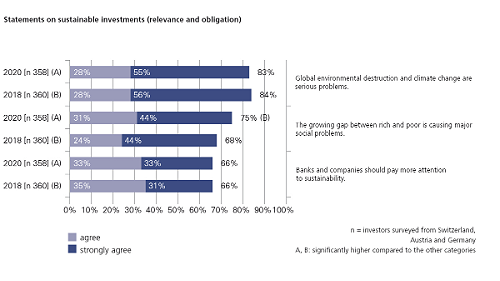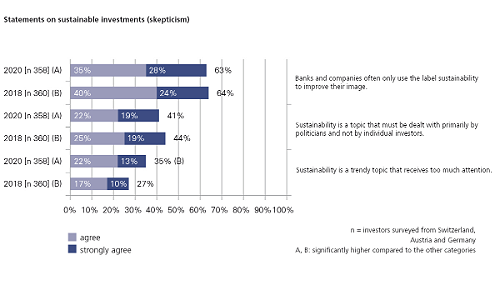Many banks are reacting to climate change and societal problems with sustainable investment products. A recent study shows why many private banking clients are not making use of such products.
By Eline Hauser, marketing manager, LGT
Sustainability has become a much talked about topic, and in recent years, banks have increasingly expanded their product range in this area.
Nevertheless, only a small number of private banking clients invest in sustainable investments, as the LGT Private Banking Report shows. And this despite the fact that an investment in such products can be very worthwhile.
Misconception That Returns Are Low
At the beginning of 2020, an average of only 5 percent of the total invested assets of Swiss, Austrian and German private banking clients were invested sustainably. In addition to this, around one-third of investors stated that they had no sustainable investments at all.
And the most astonishing thing is that these figures have hardly changed since 2016. So why do wealthy clients shy away from sustainable investment strategies?
According to the study, expected returns are one of the reasons: around 30 percent of private banking clients believe the return on sustainable investments to be lower than for traditional investments. And only around 5 percent of the respondents think that the return on sustainable investments is higher.
«It seems that we banks have not yet fully succeeded in providing investors with important facts about sustainable investments. Expectations of low returns are a persistent misconception about these investments; appropriate information could improve clients’ perception,» says Heinrich Henckel, CEO of LGT Bank Switzerland.
The Problem Isn’t a Lack of Interest, But the Offering
Despite their reservations about returns, private banking clients have a high level of awareness of sustainability and are generally interested in sustainable investments: 83 percent of the respondents indicate that environmental destruction and climate change are serious problems, and 75 percent feel that the gap between rich and poor is causing major problems in society (see figure 1).

(Investors regard environmental destruction and climate change (83 percent) as well as the growing gap between rich and poor (75 percent) as problematic. They are comparatively less inclined to agree that banks and companies should pay more attention to sustainability (65 percent).
Around half of the high-net-worth investors believe that their bank should definitely have an offering in the area of sustainability. 66 percent agree that banks and companies should be more mindful of sustainability. And price does not seem to be a significant issue: only 17 percent of private banking clients think that sustainable investments are too expensive compared to other investment products.
The real problem is that only just over half of investors believe that sustainable investments would truly help to establish ethical business standards, improve social conditions or make an important contribution to environmental and climate protection.
These views are likely attributable to a lack of knowledge about the impact of sustainable investments, and banks appear to be partly responsible for this: only a third of investors were recommended sustainable investments by relationship managers, and only a fifth are very familiar with them.
It appears, therefore, that a lack of interest is not to blame for the fact that investors are not more sustainably invested, but that the problem instead lies in the lack of information provided by banks about such products.
Consequently, the credibility of banks in this area is also low: 63 percent of the respondents believe that banks only use the sustainability label to improve their image. High-net-worth investors perceive the topic of sustainability at banks as empty words that are not followed up by actions (see figure 2).

(Private banking clients often believe that banks and companies use the label sustainability to improve their image (63 percent). Less frequently, respondents assume that it is primarily politicians who should be concerned about sustainability (41 percent) and that it is a trendy topic that receives too much attention (35 percent).
«Banks need to work harder to encourage a change in how their clients think about this matter. At LGT, we have invested a great deal of time and resources in recent years in the development of transparent sustainable investment opportunities, which have been very successful. Now we also have brought these to investors,» says Henckel.
Continued Skepticism – Especially Among Men
Further study findings indicate that the task ahead for banks will not be easy: 41 percent of the bank clients surveyed think that sustainability is a topic that must be dealt with primarily by politicians and not by individual investors. And 35 percent of those surveyed feel that sustainability is a trendy topic that receives too much attention (2018: 27 percent).
However, female investors provide one ray of hope: they generally have a more positive view of sustainable investments than men – and significantly more often regard sustainability as an important topic that banks and companies should also concern themselves with (average level of agreement: 8.1 vs. 7.5 for men).
Women are also more convinced of the impact of their own investments (6.8 vs. 5.9 for men) and less often regard sustainable investments as a trendy topic that does not concern them (5.3 vs. 5.7 for men). It is therefore not surprising that women are increasingly invested in sustainable investments – 10 percent of female private banking clients are invested sustainably with 50 percent or more of their assets.
This is still not a lot – but nevertheless more than for men, for whom the figure is only 6 percent.
As part of the LGT Private Banking Report, the Asset Management department of Johannes Kepler University in Linz, led by Finance Professor Teodoro D. Cocca, for the sixth time since 2010 conducted a survey on the investment behavior of private banking clients in Germany, Austria and Switzerland. A total of 358 individuals were surveyed in January and February 2020. The main criterion for participation in the survey was disposable investment capital. In Germany and Austria, the minimum disposable investment capital was 500 000 euros and for Switzerland, it was 900 000 francs. Due to the effects of the corona pandemic on financial markets, a follow-up survey was conducted in April 2020 with the private banking clients in Switzerland who had already been surveyed in January by the LINK Institute.











